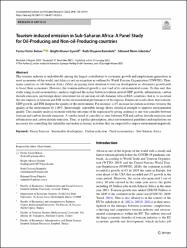| dc.contributor.author | Bekun, Festus Victor | |
| dc.contributor.author | Gyamfi, Bright Akwasi | |
| dc.contributor.author | Bamidele, Ruth Oluyemi | |
| dc.contributor.author | Udemba, Edmund Ntom | |
| dc.date.accessioned | 2023-10-06T09:39:53Z | |
| dc.date.available | 2023-10-06T09:39:53Z | |
| dc.date.issued | 2022 | en_US |
| dc.identifier.issn | 0944-1344 | |
| dc.identifier.issn | 1614-7499 | |
| dc.identifier.uri | https://hdl.handle.net/11363/5782 | |
| dc.description.abstract | The tourism industry is undoubtedly among the largest contributors to economic growth and employment generation in
most economies of the world, and Africa is not an exception as outlined by World Tourism Organization (UNWTO). Thus,
many countries in sub-Saharan Africa (SSA) are paying more attention to tourism development as alternative growth path
to boost their economies. However, the tourism-induced growth is not void of its environmental issues. To this end, this
study using recent econometrics analysis explored the nexus between tourism arrival GDP growth, urbanization, carbon
dioxide emission, and foreign direct investment for oil and non-oil sub-Saharan Africa (SSA) countries, that is, to ascertain
the real impacts of tourism and FDI on the environmental performance of the regions. Empirical results show that tourism,
GDP growth, and FDI dampen the quality of the environment. For instance, a 1% increase in tourism activities worsens the
quality of the environment by 1.09%. Interestingly, renewable energy shows statistical strength to improve environmental
quality. The causality analysis resonates with the outcomes of the regression by giving credence to one-way causality between
tourism and carbon dioxide emission. A similar trend of causality is seen between FDI and carbon dioxide emission and
urbanization and carbon dioxide emission. Thus, as a policy prescription, strict environmental guidelines and regulations are
necessary for controlling the unhealthy and undue economic activities that are suspected to impact environment negatively. | en_US |
| dc.language.iso | eng | en_US |
| dc.publisher | SPRINGER HEIDELBERG, TIERGARTENSTRASSE 17, D-69121 HEIDELBERG, GERMANY | en_US |
| dc.relation.isversionof | 10.1007/s11356-021-18262-z | en_US |
| dc.rights | info:eu-repo/semantics/openAccess | en_US |
| dc.rights | Attribution-NonCommercial-NoDerivs 3.0 United States | * |
| dc.rights.uri | http://creativecommons.org/licenses/by-nc-nd/3.0/us/ | * |
| dc.subject | Green Tourism | en_US |
| dc.subject | Sustainable development | en_US |
| dc.subject | Carbon reduction | en_US |
| dc.subject | Panel econometrics | en_US |
| dc.subject | Sub-Saharan Africa | en_US |
| dc.title | Tourism‑induced emission in Sub‑Saharan Africa: A Panel Study for Oil‑Producing and Non‑oil‑Producing countries | en_US |
| dc.type | article | en_US |
| dc.relation.ispartof | Environmental Science and Pollution Research | en_US |
| dc.department | İktisadi İdari ve Sosyal Bilimler Fakültesi | en_US |
| dc.authorid | https://orcid.org/0000-0003-4948-6905 | en_US |
| dc.authorid | https://orcid.org/0000-0002-6091-3800 | en_US |
| dc.identifier.volume | 29 | en_US |
| dc.identifier.issue | 27 | en_US |
| dc.identifier.startpage | 41725 | en_US |
| dc.identifier.endpage | 41741 | en_US |
| dc.relation.publicationcategory | Makale - Uluslararası Hakemli Dergi - Kurum Öğretim Elemanı | en_US |
| dc.institutionauthor | Bekun, Festus Victor | |
| dc.institutionauthor | Udemba, Edmund Ntom | |



















